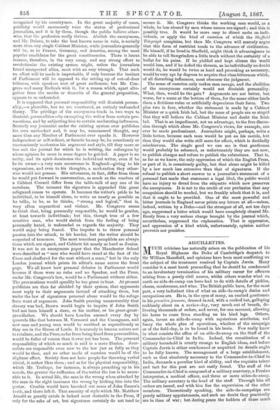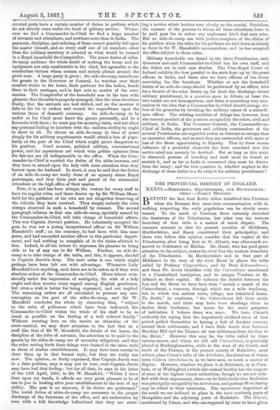AIGUILLETTES. -
MUCH criticism has naturally arisen on the publication of his Royal Highness the Duke of Cambridge's despatch to Sir William Mansfield, and opinions have been most conflicting on the subject of the treatment received by Captain Jervis. Many consider it a most harsh proceeding that he should be condemned to an involuntary termination of his military career for offences arising from a purely civil source, whilst others wonder what on earth an aide-de-camp can have had to do with details of pickles, cheese, mushrooms, and wine. The British public have, for the most part, a very indistinct idea of what an aide-de-camp's duties and occupations are. He is, in the eyes of many, an excited gentleman in his premiere jeunesse, dressed in red, with a cocked bat, galloping recklessly about on a review-day, very much out of breath, de- livering thousands of orders, and never, for one moment, allowing his horse to cease from standing on his hind legs. Others, again, invest an aide-de-camp with mysterious attributes, and fancy the whole plan of operations, whether of the campaign or of the field-day, is to be found in his brain. Few really know in what consists the office of an aide-de-camp on the Staff of the Commander-in-Chief in India. Indeed, the constitution of a military household is utterly strange to English ideas, and before Captain Jervis is either condemned or acquitted its details ought to be fully known. The management of a large establishment, such as that absolutely necessary to the Commander-in-Chief in India, demands a peculiar kind of ability, and the requisite talent and tact for this post are not easily found. The staff of the Commander-in-Chief is composed of a military secretary, a Persian interpreter, a medical officer, and three or more aides-de-camp. The military secretary is the head of the staff. Through him all orders are issued, and with him lies the supervision of the other members. Theoretically speaking, the aide-de-campships are purely military appointments, and such no doubt they practically are in time of war ; but during peace the holders of these much
coveted posts have a certain number of duties to perform which do not strictly come under the head of military service. Where- ever we find a Commander-in-Chief we find a large number of servants and attendants, and nowhere more than in India. The payment, diacipline, and ordering of these cannot possibly fall upon the master himself, ahd on every staff one of its members other than the military secretary is selected as what would be termed in a Royal household the Comptroller. The peace duties of aides- de-camp embrace the whole detail of making the house and its equipment not only comfortable to the chief, but agreeable to the numberless visitors whom custom and society attract around the great man. A large party is given ; the aide-de-camp introduces the guests to the Governor or General, he watches over their comfort whilst in the house, finds partners for the ladies, hands them to their carriages, and in fact acts as master of the cere- monies. The Comptroller of the household sees in his turn with pleasure that the table is properly arranged, that the wine circulates freely, that the servants are well drilled, and on the morrow it falls to his lot to reckon and record the expenditure upon the various items of domestic economy. An aide-de-camp to be useful to his Chief must know the guests personally, and be a favourite with them ; he mast pay his morning visite, and not allow any personal feeling to interfere with the uniform civility he ought to show to all. To choose an aide-de-camp in time of peace simply for his military acquirements would entail a loss of popu- larity on the part of the Chief which might prove dangerous to his position. Good manner, polished address, conversational power, and the mysterious art which wins golden opinions from the fair sex are all indispensable to the office. When the Com- mander-in-Chief is married the duties of the aides increase, and they have to attend upon the lady with more attention than they bestow upon the husband. In short, it may be said that the duties of an aide-de-camp are really those of an equerry about Royal personages, and they form part and parcel of the ceremonial attendant on the high office of their master.
Now, it is, and has been always, the custom for every staff to have its regular rules, and those drawn up-by Sir William Mans- field for the guidance of his own are not altogether deserving of the ridicule they have received. They simply embody the rules :always observed in such a household by consent. The second paragraph informs us that one aide-de-camp, specially named by the Commander-in-Chief, will take charge of household affairs. This was Captain Jervis's position. He voluntarily accepted the post, he was not a young inexperienced officer on Sir William Mansfield's staff ; on the contrary, he had been with him some years, and had succeeded another officer in this particular depart- ment, and had nothing to complain of in the duties allotted to Indeed, in alibis letters he expresses his pleasure in being -able to be of any use to Sir William. Further, an aide-de- -camp is to take charge of the table, and this, it appears, also fell to Captain Jervis's duty. The next order is one which might perhaps have been left out with advantage. Whenever Lady -Mansfield hints anything, such hints are to be taken as if they were absolute orders of the Commander-in-Chief. Hints labour occa- sionally under the imputation of ambiguity, the wish of a lady ought and does receive every regard among English gentlemen, but even a wish is better for being expressed, and not implied. The remaining orders are all calculated to prevent any raja- -conception on the part of the aides-de-camp, and Sir W. Mansfield concludes the whole by observing that, "subject to the rules of politeness which have been indicated, the -Commander-in-Chief wishes the whole of his staff to be as much as possible on the footing of a well ordered family." Without entering here on the merits or otherwise of the -court-martial, we may draw attention to the fact that on a staff like that of Sir W. Mansfield, the details of the house, the discipline of the tribe of servants, the attention to be paid to the _guests by the aides-de-camp are of necessity obligatory, and that the rules setting forth these things were framed in the same style as those of similar establishments. It may have been unwise to ,-draw them up in that formal style, but they are really not new. The opinion, so freely expressed, that Captain Jervis was in a false position, may or may not be true, even Captain Jervis may have had that feeling ; but for all that, he says in his letter 'of the 14th April, 1866, to Sir W. Mansfield, "Whilst I have time upon my hands, it affords me very great pleasure to be of use to you in looking after your establishments to the best of my ability. The post is no ainecure, if its duties are performed." The social duties of aides-de-camp are necessary to the proper discharge of the functions of the office, and are undertaken by men with a full knowledge beforehand that they are enter- ing a service which borders very closely on the menial. Donbtless, the manner of the persons to whom all these attentions have to be paid goes far to soften any unpleasant hitch that may arise. But no aide-de-camp can with justice complain of the duties of his position when the rules for his guidance are laid down as clearly as those in Sir W. Mansfield's memorandum, and he has accepted the office subject to those rules.
Military households are fonnd in the three Presidencies, each Governor and each Commander-in-Chief has his own staffs and the duties are in each case similar. The Vice-Regal Court of Ireland exhibits the best parallel to the state kept up by the great officers in India, and there also we have officers of the Army exercising the like functions. Whether or not the household duties of an aide-de-camp should be performed by an officer, who for a breach of the rules drawn up for their due discharge incurs military punishment, is a question open to debate, at least the two trades are not homogeneous, and there is something very ano- malous in the idea that a Commander-in-Chief should avenge the loss of his groceries by breaking the military career of a subordi- nate officer. The existing condition of things has, however, been the natural product of the position occupied by the rulers, civil and military, in India. The Governor-General, the Commander-in- Chief of India, the governors and military commanders of the several Presidencies are regarded rather as viceroys or satraps than as executive officers, and as such they are surrounded with more or less of the State appertaining to Royalty. That by these means influence of a powerful character has been exercised over the native mind can scarcely be doubted. But so long as this state is observed, persons of breeding and rank must be found to sustain it, and as far as India is concerned they must be drawn from the Army ; and the true question is, whether neglect in the discharge of those duties is a fit subject for military punishment?































 Previous page
Previous page